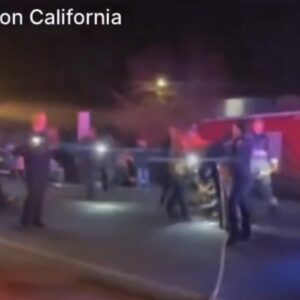A Week After Charlie Kirk’s Assassination, New Details Emerge About His Final Moments
The death of a political figure is rarely confined to private grief. When tragedy unfolds before thousands, it becomes both a matter of national reckoning and an intimate story of loss. One week has now passed since the assassination of Charlie Kirk, the 31-year-old founder of Turning Point USA, and the shock has yet to fade. Instead, each day brings new fragments of information — pieces that illuminate not only the violence of that afternoon, but also the desperate, ultimately futile, efforts to save his life.
What began as the launch of Kirk’s “American Comeback Tour” at Utah Valley University has instead become a grim case study in political violence, the fragility of life under the spotlight, and the anguish of those who tried to preserve it. Among the most striking accounts is the testimony of Frank Turek, Kirk’s longtime friend and mentor, who was with him in the frantic moments after the gunfire.
The Shooting That Shook a Movement
On September 10, Kirk stood before an audience of more than 3,000. Known for his combative debating style, he was taking a question on gun violence when a single shot rang out.
The bullet, allegedly fired by 22-year-old Tyler Robinson from a rooftop nearby, struck Kirk in the neck, severing key arteries. In an instant, the activist who built his career on amplifying his voice was rendered silent.
Panic spread through the venue. Security rushed to the stage as attendees screamed. Within seconds, Kirk’s limp body was lifted into a waiting vehicle. From that point forward, every second mattered.
A Week of Painful Revelations
In the days since, new details have surfaced, painting a fuller picture of Kirk’s final hours. Homeland Security Secretary Kristi Noem disclosed that Kirk had sent her a private text the night before his death — a message now parsed by supporters as a possible reflection of his mission. Neuropsychologist Derek Van Schaik analyzed footage of the shooting and concluded that Kirk likely never registered what had happened, losing consciousness in less than half a second.
But perhaps the most harrowing testimony has come from Frank Turek, the Christian apologist and author who described riding with Kirk during the desperate dash to the hospital.
“Charlie Was Like a Son to Me”
“Charlie Kirk was literally a son to me,” Turek, 63, said on his podcast Cross Examined, his voice breaking. “So if your son got hit, what would you do? You get in that car. You do everything you can, no matter what.”
And so he did. As Kirk’s body was loaded into the vehicle, Turek climbed in beside him. What followed was a frantic race against time, blood loss, and fate.
One haunting detail still lingers: Kirk’s tall frame was too large for the back seat. His body stretched so far across that rescuers could not shut the car door. “Charlie is laid out right in front of me, and Charlie’s so tall we can’t close the door,” Turek recalled.
The image is both heartbreaking and symbolic — a leader too large for the confines of the car, straddling the threshold between life and death as the vehicle tore through the streets with one door hanging open.
Inside, Turek alternated between performing CPR and pleading with his friend to hold on. “Come on, Charlie, come on, come on,” he repeated, pressing on his chest. Members of Kirk’s security team worked calmly but urgently, applying pressure to the wound. They were trained for such moments, but the injury was catastrophic.
By the time they reached Timpanogos Regional Hospital, Turek knew the fight was over. “Charlie wasn’t there,” he said quietly. “His eyes were fixed. He wasn’t looking at me. He was looking past me, right into eternity. He was with Jesus already.”
Faith and Finality
For Turek, solace lies in faith. “Absent from the body, present with the Lord. That’s where Charlie is,” he said. “He didn’t suffer. He didn’t even know. He was gone in an instant.”
Neuroscience offers a similar conclusion. Van Schaik explained that with a wound severing both the carotid artery and jugular vein, Kirk would have lost consciousness in less than half a second. “No panic, no dread, no awareness of death,” he said. “Only an abrupt blackout.”
In that way, both faith and science converge on a single point: Charlie Kirk did not suffer.
The Symbolism of His Last Words
Supporters have also noted the cruel irony of the moment. Kirk was addressing gun violence when violence silenced him. He was speaking to a crowd of students — the audience that most defined his career — when his voice was taken away.
To critics, Kirk was a polarizing figure. To allies, he was a warrior for conservative values. To both, his death at a university podium crystallized the very divisions that shape American politics today.





